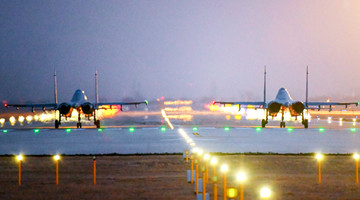SHENZHEN, Oct. 16 (Xinhua) -- A senior official of the Chinese Foreign Ministry said on Wednesday that China calls for maintaining global strategic stability and reducing risks of nuclear conflicts.
Fu Cong, director general of the Department of Arms Control of the Foreign Ministry, made the remarks at the opening ceremony of the 16th PIIC Beijing Seminar on International Security held in south China's Shenzhen, Guangdong Province.
Fu said the global strategic security situation has dramatically worsened in recent years, with the U.S. returning to the cold war mentality, having withdrawn from or reneged on a host of multilateral arms control agreements, shirking international responsibilities and seeking overwhelming military superiority.
Influenced by these moves, mutual trust and cooperation between major powers have been severely eroded, the global strategic stability is being seriously undermined, the international norms and multilateral regimes are under severe stress, and the deficit of global security governance has increased, Fu said.
Fu said continued erosion of global strategic stability will inevitably lead to a relapse of nuclear arms race and the risks of nuclear conflicts will increase. All nuclear-weapon states should take measures to diminish the role of nuclear weapons in their national security doctrines, provide security assurances to non-nuclear-weapon states, and avoid acts that undermine global strategic stability and exercise restraint in building and deploying strategic capabilities.
Nuclear disarmament should be pursued in a reasonable and pragmatic manner, Fu said, adding nuclear-weapon states should enhance dialogues on nuclear doctrines and strategies. Nuclear non-proliferation issues should be resolved through political and diplomatic means, and the challenges created by emerging technologies should be properly addressed.
Fu said that China expresses its deep regret over the U.S. withdrawal from the INF Treaty. "It is of China's view that the U.S. withdrawal will have a direct negative impact on global strategic stability, on peace and security in Europe and the Asia-Pacific region, as well as the international arms control regime."
The fact that the U.S. has conducted a ground-based intermediate-range cruise missile test less than three weeks after its withdrawal from the treaty shows that its withdrawal was meant to free its hands in developing advanced weaponry in order to seek unilateral military advantage, said Fu.
China firmly opposes the U.S deployment of ground-based intermediate-range missiles in the Asia-Pacific region, said Fu. The U.S. missiles, if deployed in the region against others' expectations, would be virtually on China's doorstep. Should that happen, China would have no choice but to take necessary countermeasures in defence of its national security. "China urges the U.S. and other countries concerned to exercise restraint and prudence on this matter."
Fu also introduced China's efforts in maintaining global strategic stability, including China's policy of "no first use of nuclear weapons", and stressed that China has shown maximum transparency in its nuclear strategy, exercised the utmost restraint on the development of its nuclear force and adopted an extremely prudent attitude toward the use of nuclear weapons.
He said China will remain committed to peaceful development and continue to advocate for multilateralism. "China will always be a positive force for international arms control and disarmament efforts and a contributor to the lofty cause of safeguarding peace and security of the mankind."
The 16th PIIC Beijing Seminar on International Security is organised by the China Arms Control and Disarmament Association (CACDA), Program for Science and National Security Studies (PSNSS) and Nuclear Threat Initiative (NTI). More than 100 representatives from China, the United States, Russia, the U.K. and other countries as well as international organizations attended this seminar.









